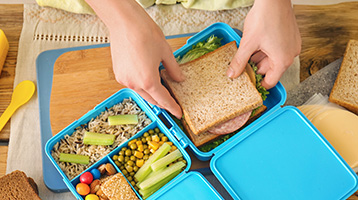The Importance of Healthy Eating Habits for Kids in School
[shareaholic app="share_buttons" id="27983777"]
Parents and schools who help their children and students adopt healthy eating habits from a young age can have a positive influence on their kids’ dietary habits later in life as well as affecting their performance in school. Eating healthy, balanced meals have been linked to higher grades, better memory, and alertness.
Why it’s important
Research has shown that students can learn better when they are well nourished. Healthy students typically have higher test scores, reduced absences, and improved memory. These students can be active in learning which helps set them up for better opportunities in the future. Good eating habits in children also leads to a reduction of obesity, depression, diseases, heart disease, and diabetes.
What foods are best?
Healthy, nutrient-dense foods that are rich in fiber, protein, and healthy fats (such as eggs, yogurt, and oatmeal) allow enough energy to help keep the child-focused throughout the entire day. Colorful foods like blueberries and red peppers contain antioxidants, vitamins, and fiber that support healthy growth. Also, raw versions of fruits and vegetables contain the most vitamins and minerals. A variety of whole and fresh foods is a sure way to help your child receive all the nutrients they need.
Strategies to Encourage Kids to Eat Healthy
While kids can be picky, they typically eat what is available at home. Work fruits and vegetables into your daily meals and limit fat intake by avoiding fried foods and choosing healthier cooking methods, such as grilling or baking. Keep healthy snacks easily available for the kids to choose from (such as peanut butter or whole-grain crackers) as opposed to processed junk food. Limit sugary drink options both at home and at school. One of the best ways to encourage healthy eating is to eat well yourself and being a good role model with a positive approach to healthy food!


